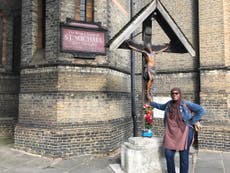The Independent's journalism is supported by our readers. When you purchase through links on our site, we may earn commission.
Rich oral histories are changing everything we thought we knew about West Indian migration to Britain
Engaging with the stories of the West Indian community forces a realignment of the culture with its past, removing the danger of solely associating the word ‘Windrush’ with ‘scandal’

Throughout West Indian households, like the one in which I grew up in 1970s Luton, you will hear the phrase, “Me don’t like people chat my business.” There has always been a reticence about sharing information. That reluctance is in part the result of fear and anxiety that information volunteered might be used against you. It explains, I think, why so many of my parents’ generation clung to their nicknames – which were often simply physical descriptions. My father was called “Bageye” because of his baggy eyes; “Pumpkin head” had a pumpkin-shaped head and “Clock” had one arm longer than the other.
Though the nicknames were humorous, they also seemed designed to keep you from truly knowing the individuals’ true selves. It was as if the West Indian adults of my youth had a kind of emotional exoskeleton which we could not penetrate. It was problematic, because without a narrative to frame your life, without history, what are you?
Marcus Garvey, the great 20th century Pan Africanist, famously asserted that, “a people without a history is like a tree without roots.” History grounds you and gives you a centre. Too often in West Indian households in Britain children were denied this grounding through an absence of story. Perhaps parents were too busy getting on in their new and bewildering homeland, working and providing for the material side of their children’s lives without giving enough attention to the spiritual dimension.
That nervousness about sharing information was passed on, like a meme, to the children. This was evident when I turned up to interview people who were now in their eighties for Homecoming, an oral history of Caribbean migration to Britain from the 1940s-60s. The front door would be opened by adult children who remained in the room during interviews, barely masking their suspicion. They seemed determined to police their parents’ stories, to ensure that no embarrassing family histories (real or imagined) leaked out. There was an attempt to tidy up and simplify the stories as well. But life is untidy and you cannot legislate for embarrassment.
Often, when I sat with my elderly interviewees, a veil of respectability would descend as soon as I switched on the recording machine. Though I am black, at such times I was reminded of the tetchiness of the writer and anthropologist Zora Neale Hurston towards white researchers who increasingly in the 1930s, during the heyday of the Federal Writers’ Project, turned their focus on African American lives. Hurston questioned the motives of the researchers; she felt some of the African American interviewees were being exploited; their stories mined to further the careers of the researchers. But, perhaps because of my Jamaican ancestry, that apprehension, if it existed amongst the octogenarians I met, soon lifted. By the end, the adult children were turning to me and saying, “We've never heard these stories before or in such detail.” I began to think of these testimonies as antiques like those brought out by amateurs at the Antiques Roadshow. The stories were precious jewels that had been tucked away in a corner in the past, and their true value was only now being fully appreciated.
Oral history amplifies individual tales. Mixing contemporary accounts with memories and reminiscences added to the depth of these testimonies. I began to see that the cliches we’d become inured to – like those about the difficulty of finding accommodation in the 50s and 60s, characterized by the notes left in shop windows saying “No Dogs, No Black, No Irish” – had been seen by almost every West Indian I spoke to. Sometimes the impact of those daily humiliations had laid dormant but were still there, just beneath the surface.
Ninety-two-year-old Waveney Bushell, who arrived from British Guiana (now Guyana) more than half a century ago, told me that she saw so many of those signs in the windows that, “till today, more than 60 years later, I would have trouble going up and knocking on a stranger’s front door if I suspected the door would be opened by a white person.”
The hostile environment was in place well before 2012. Its formal enactment by Theresa May’s Home Office was just a refinement of what was always there. But there’s the danger that the word “Windrush” will now forever be associated with the word “scandal”. This must be resisted. Ever since the beginning of mass migration West Indian lives, as represented in news reports, books and government surveys, have too often been cast as problematic. It was there even in left-leaning publications like the Picture Post, which in 1954 ran the headline, “Would you let your daughter marry a Negro?”
We must, as Jamaicans say, “turn the argument” to recall the vibrancy of the Caribbean pioneers who brought technicolour to the monochrome streets of Britain. The alchemical possibilities of the Caribbean input into British culture is reflected in the Leeds West Indian Carnival and in Sheila Howarth the Carnival Queen who told me: “no one had ever praised me [but] when you’re wearing that costume, you can pretend it’s not you. You kind of morph into what it is and are transformed into something spectacular.”
Oral history, as with the spectacular West Indian presence in Britain, forces a realignment of the culture with its past. The accumulative effect of individual stories is irresistible.
After a while the accounts settle into a compelling pattern, layers upon layers, offering myriad perspectives on a number of shared experiences so that, as Richard Beard has written (and I hope is true of Homecoming), the reader will get a sense of “the voices gradually merging into a kind of great rolling harmony of truth.”
Colin Grant is an author and historian, his latest book, Homecoming: Voices of the Windrush Generation is available here



Join our commenting forum
Join thought-provoking conversations, follow other Independent readers and see their replies